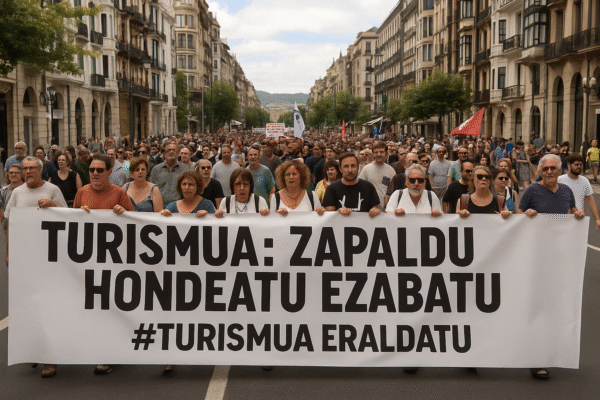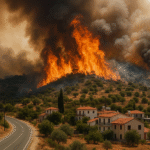The Basque Country, one of Spain’s most celebrated cultural and culinary regions, is now facing mounting backlash over the consequences of unregulated tourism growth. In recent months, public sentiment has shifted dramatically, with residents of cities like Bilbao and San Sebastián taking to the streets in protest of the adverse social and economic effects brought on by a surging influx of visitors.
According to recent findings from the Basque Government’s quarterly tourism assessment, public satisfaction with tourism fell to a stark 3.9 out of 10 in Q2 2025, down from 5.9 in the same period in 2024. This significant drop highlights a growing divide between tourism-driven economic gains and the everyday experiences of local residents.
Housing Pressures and Gentrification Spark Community Uproar
At the heart of local grievances lies the region’s escalating housing crisis, fueled by the explosive growth of short-term tourist rentals on platforms like Airbnb. The increase in demand for holiday accommodation has led to a sharp rise in property prices and monthly rents—especially in central neighborhoods historically occupied by working-class families.
In Bilbao and San Sebastián, gentrification is transforming once-vibrant local communities into tourist-centric zones. Traditional markets and family-owned shops are being replaced by souvenir stands, luxury boutiques, and international food chains, eroding the cultural authenticity that made these cities attractive to tourists in the first place.
“Locals can no longer afford to live in their own neighborhoods,” said a protestor during a demonstration in San Sebastián in early July. “Tourism is suffocating our identity.”
Social Friction and Disruption of Daily Life
Beyond housing, residents have expressed frustration over daily disruptions linked to mass tourism. Noise pollution, overcrowded public spaces, and a perceived decline in public services are some of the most common complaints.
Moreover, the increasing segmentation of services geared toward high-income tourists has created a growing sense of exclusivity, alienating locals from newly developed public spaces and cultural attractions. This perceived social exclusion has only deepened resentment toward the current tourism model.
In Q2 2025 alone, the region recorded 21 organized protests related to tourism, a 75% increase over the same quarter last year, according to data from the Basque Institute of Statistics (Eustat).
Positive Developments Overshadowed by Discontent
Despite these issues, the Basque Country continues to experience notable tourism achievements. Events like Basque Fest and the hosting of the 2025 UEFA Europa League Final in Bilbao brought international attention and a boost in visitor numbers. New transportation links—including the Bilbao–New York direct flight—have further solidified the region’s position as a global destination.
Vitoria-Gasteiz, the Basque Country’s green capital, has also implemented innovative efforts to promote inclusive and tech-enabled tourism, aiming to reduce the environmental footprint of travelers. Yet, these initiatives appear insufficient to shift the dominant narrative of discontent among residents.
Reform Calls Grow for a Sustainable and Equitable Tourism Model
The regional government is now under increasing pressure to rethink the tourism model. Proposals on the table include:
- Stricter regulation on short-term rentals, potentially limiting the number of tourist licenses issued in urban centers.
- Decentralizing tourism by investing in lesser-visited inland and rural areas, thereby distributing the tourism load more evenly.
- Encouraging cultural preservation initiatives that prioritize local heritage over commodification.
- Establishing a regional tourism management authority to ensure community interests are represented in tourism planning.
“We must move beyond visitor volume and focus on quality, sustainability, and equity,” said a spokesperson from the Basque Tourism Agency. “Tourism should enhance—not degrade—our communities.”
Aligning Tourism Growth With Community Values
Educational campaigns and citizen consultations are being planned in conjunction with local municipalities to engage communities in shaping future tourism strategies. The Basque Country’s Sustainable Tourism Strategy 2030, published by the Department of Tourism, Trade and Consumer Affairs, outlines an ambition to foster balanced tourism growth by strengthening governance and promoting year-round, low-impact travel.
This long-term vision includes measurable goals such as a 15% reduction in tourism-related carbon emissions by 2030 and ensuring that 80% of tourism revenues directly benefit local economies.
Conclusion: A Turning Point for Basque Tourism
The backlash unfolding in the Basque Country is reflective of a broader trend seen across Europe, from Barcelona to Venice, where local populations are increasingly pushing back against overtourism. However, the Basque response presents an opportunity for the region to become a pioneer in sustainable, community-first tourism reform.
By prioritizing local well-being, cultural preservation, and economic fairness, the Basque Country can transform today’s unrest into a model of resilience for other destinations grappling with similar challenges. If successful, the region could emerge not only as a world-class destination—but also as a global benchmark for ethical tourism practices.
For more travel news like this, keep reading Global Travel Wire


















